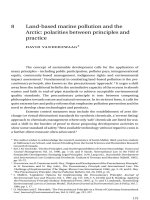42056 conflicts between teens and parents
Bạn đang xem bản rút gọn của tài liệu. Xem và tải ngay bản đầy đủ của tài liệu tại đây (200.77 KB, 2 trang )
When a teen and a parent argue, it does not mean that something is wrong with their relationship. It
means that the participants are on different wavelengths in wishes, values, attitudes or beliefs. Conflict
is never easy, but it is more prevalent in households where there are teenagers attempting to establish
individualism and a parent reluctant to accept the changes.
Where there are an adolescent and a parental figure in a home, any
topic can trigger a disagreement. Topics that cause the greatest stress
in a family include household rules and responsibilities, according to
Dr. Carl E. Pickhardt, an expert in parenting. School-related issues
also set off many arguments, as does nonconformance to values held
by the family.
Certain processes must occur for the child to reach healthy emotional adulthood, according to Carl
Pickhardt, Ph.D. He identifies separation, differentiation and opposition as necessary processes.
In the separation process, the teen wants distance from parents and family to gain individuality in the
social world and to establish privacy. Because of the desire to separate, the teen communicates less with
the parents, which concerns them.
In the period of differentiation, the teen begins to experiment with self-images to discern who he wants
to become. Hair, clothing styles and individual image are important to the teen. Often, the parent does
not agree with some of the choices, which is natural.
Opposition is the process of challenging parental authority. Parent and child disagree about what is
acceptable, fair, good or bad. Disagreement can become a way of life in the family.
Often conflict between teens and parents turns into a battle of wills. Both parties strive to win each
argument, and winning rather than communication becomes the objective.
Blame is a destructive entity in any conversation. Understanding what someone is saying is the
necessary focus, not who is at fault.
Yelling tends to shift the emphasis onto who can be louder, not the essence of the conversation.
Dr. Teri Apter, a specialist in family dynamics, explains that a teenager wants acknowledgment from a
parent. The teen expects the parent to know that this transforming individual can act like an adult and
make good decisions. The recognition of maturity and value as a person is also high on a teenager's list.
Academic studies, society and peers cause most of the pressure that a teenager must endure. The way
that the teen chooses to handle the burdens of upcoming adulthood can determine her future path. An
observant and guiding parent can help along the way.
by Sandi Hoffman - March 27, 2010
Complete the sentences according to the text.
Parents and children have conflicts due ...
Teens oppose their parents to ...
Teenagers suffer pressure ...
Reread the text and answer the following questions.
Reread the text and answer the following questions.
What can cause a conflict between parents and their teens?
What can cause a conflict between parents and their teens?
Why do some conflicts become “battles”?
Why do some conflicts become “battles”?
What does Dr. Teri Apter say about teenagers’ expectations?
What does Dr. Teri Apter say about teenagers’ expectations?
What
Whatdo
dothe
theunderlined
underlinedwords
wordsrefer
refer
to
toin
inthe
thetext.
text.
their
their
it
it
he
he
which
which
5- her
5- her
Find
Findequivalent
equivalentwords
wordsin
inthe
thetext.
text.
distances
distances
make happen
make happen
obtain
obtain
make out
make out
try very hard to achieve
try very hard to achieve
Rewrite
Rewritethe
thesentences
sentencesstarting
startingby
bythe
thewords
wordsgiven.
given.
Carl Pickhardt identifies separation, differentiation and opposition as necessary processes.
Carl Pickhardt identifies separation, differentiation and opposition as necessary processes.
Separation, differentiation …
Separation, differentiation …
Unless you are an observant and guiding parent you won’t help your child.
Unless you are an observant and guiding parent you won’t help your child.
If you …
If you …
Academic studies, society and peers are causing most of the pressure.
Academic studies, society and peers are causing most of the pressure.
Most of the pressure …
Most of the pressure …
“Household rules and responsibilities have caused
the greatest stress in family” said Dr. Carl.
III- Writing
“Household rules and responsibilities have caused
the greatest stress in family” said Dr. Carl.
Dr. Carl told …
Dr. Carl told …
“Why do you have conflicts with your parents?” asked the teacher.
“Why do you have conflicts with your parents?” asked the teacher.
The teacher asked …
The teacher asked …
In
Inaatext
textof
ofabout
about150-170
150-170words,
words,comment
commentthe
thestatement
statementbelow.
below.
“Parenting teenagers is a challenge for most parents. The onset of adolescence -- which
“Parenting teenagers is a challenge for most parents. The onset of adolescence -- which
varies from teenager to teenager, according to their physical and emotional maturity -- often
varies from teenager to teenager, according to their physical and emotional maturity -- often
brings about dramatic changes in behavior that can cause distress and conflict between
brings about dramatic changes in behavior that can cause distress and conflict between
teenagers and their parents.” David Dunning - September 3, 2010
teenagers and their parents.” David Dunning - September 3, 2010









